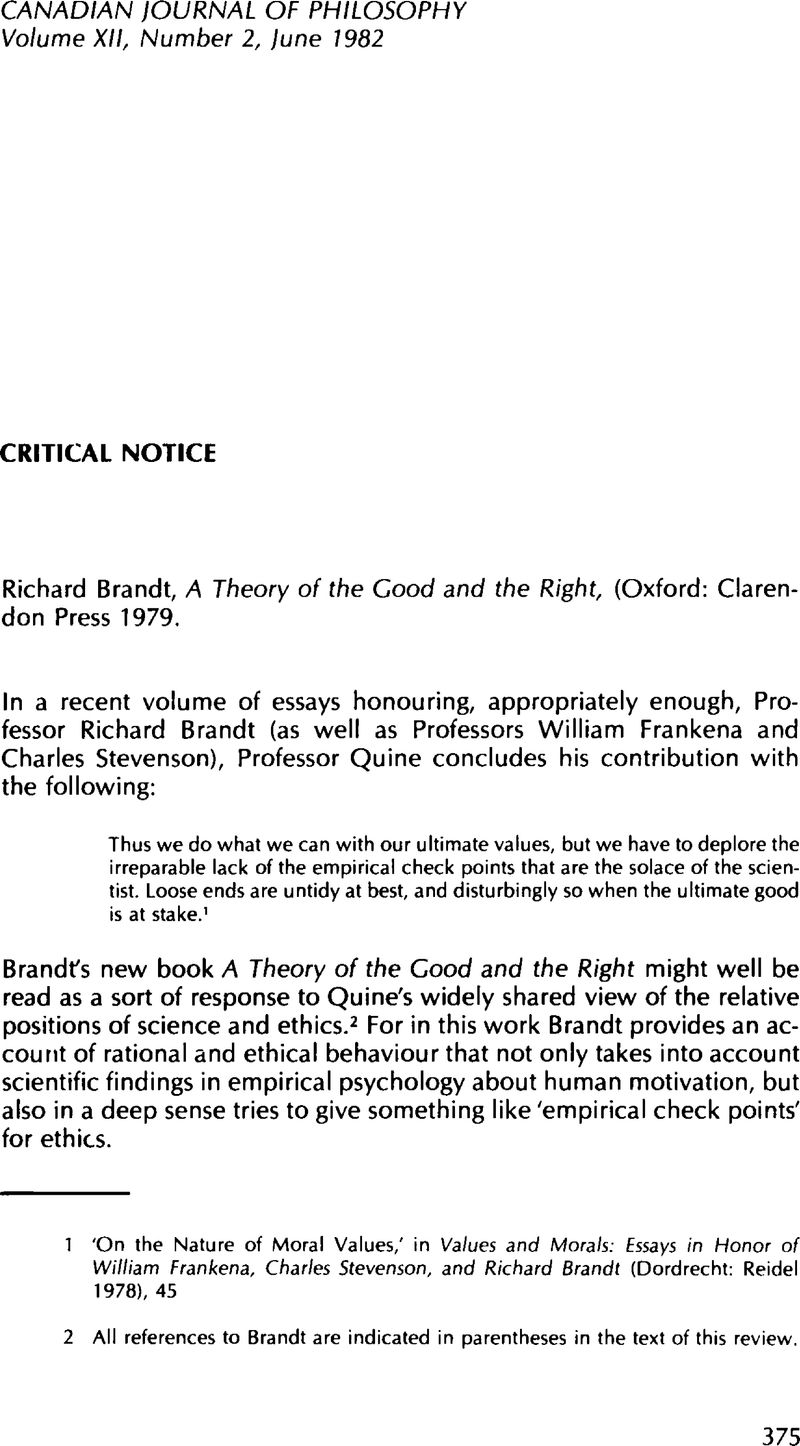No CrossRef data available.
Published online by Cambridge University Press: 01 January 2020

1 ‘On the Nature of Moral Values,’ in Values and Morals: Essays in Honor of William Frankena, Charles Stevenson, and Richard Brandt (Dordrecht: Reidel 1978), 45
2 All references to Brandt are indicated in parentheses in the text of this review.
3 Englewood Cliffs, N.J.: Prentice Hall 1959
4 See Richards, David A.J. A Theory of Reasons for Actions (Oxford: Clarendon Press 1971)Google Scholar for an outstanding consideration of this type of rationality.
5 See Harman, Gilbert The Nature of Morality (Oxford: Clarendon Press 1977).Google Scholar ch. 6 for a useful outline of this servitude.
6 If this example isn't convincing, I think other cases can be readily provided, e.g. of compulsive action such as hand-washing or automatic or reflex action such as knee-jerking.
7 See my paper ‘Utilitarianism, Self.Forgetfulness, and Spontaneity,’ Dialogue, 19 (1980) 422–35.
8 ‘Autarchy and Interest,’ The Australasian Journal of Philosophy, 56 (1978) 1 09–25
9 Ibid. 119–20
10 See Methods of Ethics (London: Macmillan 1965), Part Ill, ch. xiv
11 Methods, 381
12 On this point see, Schnewind's, Jerome brilliant exposition of Sidgwick's arguments in Sidgwick's Ethics and Victorian Moral Philosophy (Oxford: Clarendon Press 1979),Google Scholar ch. 9 and 10, especially pp. 265-9.
13 See Schneewind, pp. 417-18, who says, The starting-point of Sidgwick's argument is the demonstration, through reasoning and appeal to introspection, that we have a unique, irreducible concept of ‘being a reason for’ as it applies to action and desire. From this concept we learn that our own ability to reason involves a unique kind of demand on both the active and sentient aspects of our nature, the de– mand that our acts and desires be reasonable.
14 I would note that similar sounding passages are to be found in latter part of the book in the exposition of the theory of the right. In fact, at some points Brandt seems to build into his concept of morality what I would take to be, following Kant, a form of universalizability, viz. publicity. So that moral rules seem to have to be imagined as such that they can be publicly known and advocated if they are to count as ‘moral rules’ at all (e.g. p. 299). But such a ‘linguistic’ argument would run counter to Brandt's deepest convictions about how to do moral philosophy (see Ch. 1, section 1).
15 For a parallel repudiation of ‘a priorism’ in moral matters see pp. 217-18 in which Sidgwick is explicitly discussed.
16 Harman, 45
17 A nice, albeit unscientific, illustration of my point can be found in a cable from the last American charge d'affaires in Iran, Bruce Laingen, to then Secretary of State Vance, as reported in The Globe and Mail for January 28, 1981 (page 8): Perhaps the single dominant aspect of the Persian psyche is an overriding egoism. Its antecedents lie in the long Iranian history of instability and insecurity which put a premium on self-preservation. The practical effect of it is an almost total preoccupation with self and leaves little room for understanding points of view other than one's own. Laingen goes on to describe two other interesting features of the socalled ‘Persian psyche': first, a ‘bazaar mentality’ which often ignores long term interests in favor of immediately obtainable advantages; and second, a general incomprehension of causality, which Laingen attributes to Iran's Islamic culture. Now all three of these - overriding egoism, bazaar mentality, and incomprehension of causality - if true would I think be disturbing to someone like Hare: how could one get the Persian to see things from one's own perspective? But it ought to be far more disturbing to Brandt in one way (rational people may be so strikingly unlike that we cannot even assume that ignoring future desires is paradigmatically irrational). though not disturbing in another way (nothing in Brandt's notions of rationality commits him in principle to such similarity).
18 See ‘Autarchy and Interest,’ 123-5.
19 To a limited degree I try to deal with this question in my paper ‘Utilitarianism, Self-Forgetfulness, and Spontaneity.'
20 Hart, H.L.A. The Concept of Law (Oxford: Clarendon Press 1961), 189–95Google Scholar
21 Methods, 338 and 341–2